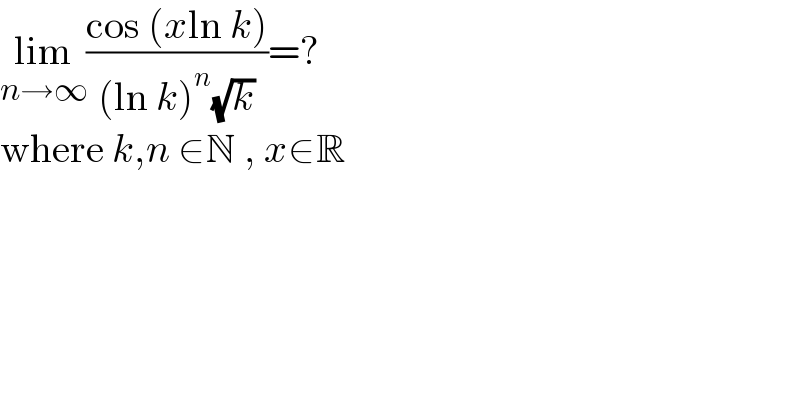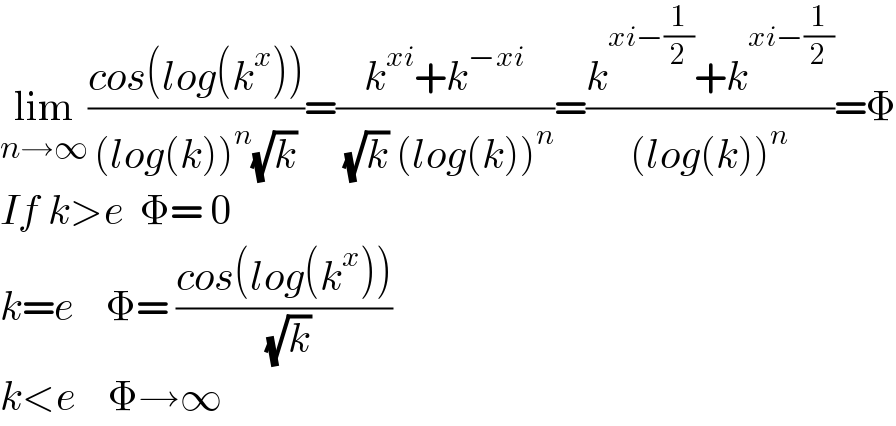
Question Number 132321 by Raxreedoroid last updated on 13/Feb/21

$$\underset{{n}\rightarrow\infty} {\mathrm{lim}}\frac{\mathrm{cos}\:\left({x}\mathrm{ln}\:{k}\right)}{\left(\mathrm{ln}\:{k}\right)^{{n}} \sqrt{{k}}}=? \\ $$$$\mathrm{where}\:{k},{n}\:\in\mathbb{N}\:,\:{x}\in\mathbb{R} \\ $$
Answered by Dwaipayan Shikari last updated on 13/Feb/21

$$\underset{{n}\rightarrow\infty} {\mathrm{lim}}\frac{{cos}\left({log}\left({k}^{{x}} \right)\right)}{\left({log}\left({k}\right)\right)^{{n}} \sqrt{{k}}}=\frac{{k}^{{xi}} +{k}^{−{xi}} }{\:\sqrt{{k}}\:\left({log}\left({k}\right)\right)^{{n}} }=\frac{{k}^{{xi}−\frac{\mathrm{1}}{\mathrm{2}}} +{k}^{{xi}−\frac{\mathrm{1}}{\mathrm{2}}} }{\left({log}\left({k}\right)\right)^{{n}} }=\Phi \\ $$$${If}\:{k}>{e}\:\:\Phi=\:\mathrm{0} \\ $$$${k}={e}\:\:\:\:\Phi=\:\frac{{cos}\left({log}\left({k}^{{x}} \right)\right)}{\:\sqrt{{k}}} \\ $$$${k}<{e}\:\:\:\:\Phi\rightarrow\infty \\ $$
Commented by Raxreedoroid last updated on 13/Feb/21
![sir I think the answer is always 0 except for k = 1 since cos(x) where x ∈ R is between [−1,1] and lim_(x→∞) (1/(a∙b^x ))=0 so in that case lim_(n→∞) ((cos (log(k^x )))/((log(k))^n (√k)))=(([−1,1])/(incredibly large))=0 ,k≠1](Q132342.png)
$$\mathrm{sir}\:\mathrm{I}\:\mathrm{think}\:\mathrm{the}\:\mathrm{answer}\:\mathrm{is}\:\mathrm{always}\:\mathrm{0}\:\mathrm{except}\:\mathrm{for}\:\mathrm{k}\:=\:\mathrm{1} \\ $$$$\mathrm{since}\:\mathrm{cos}\left({x}\right)\:\mathrm{where}\:{x}\:\in\:\mathbb{R}\:\mathrm{is}\:\mathrm{between}\:\left[−\mathrm{1},\mathrm{1}\right] \\ $$$$\mathrm{and}\:\underset{{x}\rightarrow\infty} {\mathrm{lim}}\frac{\mathrm{1}}{{a}\centerdot{b}^{{x}} }=\mathrm{0} \\ $$$$\mathrm{so}\:\mathrm{in}\:\mathrm{that}\:\mathrm{case} \\ $$$$\underset{{n}\rightarrow\infty} {\mathrm{lim}}\frac{\mathrm{cos}\:\left(\mathrm{log}\left(\mathrm{k}^{\mathrm{x}} \right)\right)}{\left(\mathrm{log}\left(\mathrm{k}\right)\right)^{\mathrm{n}} \:\sqrt{{k}}}=\frac{\left[−\mathrm{1},\mathrm{1}\right]}{\mathrm{incredibly}\:\mathrm{large}}=\mathrm{0}\:,{k}\neq\mathrm{1} \\ $$
Commented by Raxreedoroid last updated on 13/Feb/21

$$\mathrm{sorry}\:\mathrm{my}\:\mathrm{mistake} \\ $$$$\mathrm{ln}\left(\mathrm{k}\right)\:\mathrm{where}\:\mathrm{k}>\mathrm{1}\:\mathrm{is}\:\mathrm{between}\:\left(\mathrm{0},\infty\right) \\ $$$$\mathrm{so}\:\mathrm{your}\:\mathrm{answer}\:\mathrm{was}\:\mathrm{right} \\ $$
